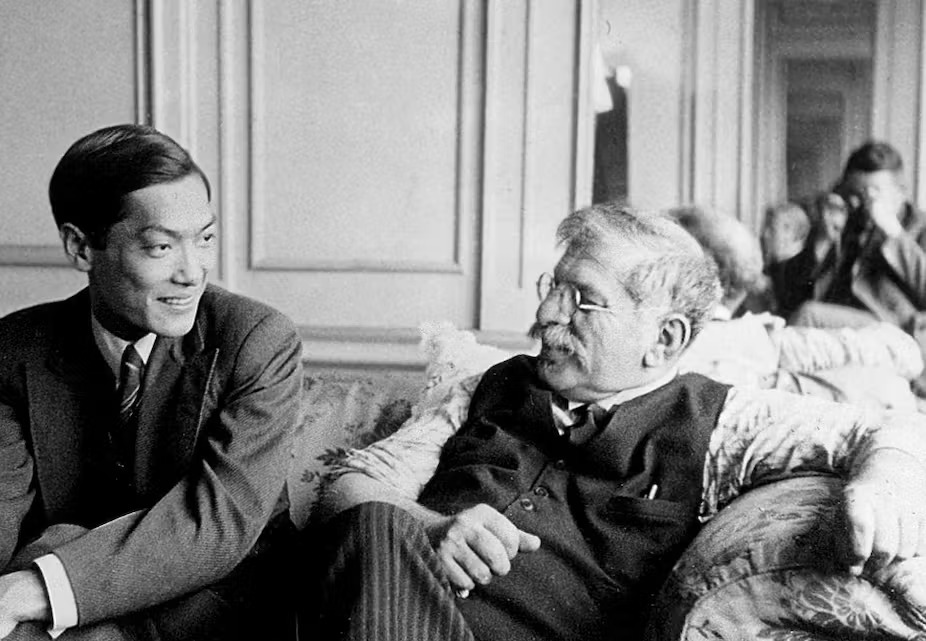Although Marx and Engels had already mentioned homosexuality in some of their writings — as well as reflections on gender, sexuality, and the family — it was the demands and actions of organized revolutionaries during the first attacks on LGBTQ+ people across Europe that demonstrated the potential of the alliance between the LGBTQ+ movement and the revolutionary Left. Here we look back at the birth of the homosexual movement in Germany, its ties to socialism, and the lessons of this alliance — in its victories and defeats.
Precursors of the Homosexual Movement in Europe
In Sexuality and Socialism, Sherry Wolf paints a portrait of Edward Carpenter, one of the first openly gay men in the public eye. An influential English socialist in the 1870s, Carpenter had a background in the anarchist and utopian branches of English socialism. He wrote extensively on women’s emancipation and class society. At a time when homosexuality was illegal, Carpenter’s writings and public speeches linked the Victorian climate of sexual repression to an economic system based on competition. Dialoguing with his German predecessor Karl Ulrichs, Carpenter defended the idea that there exists within everyone a homosexual potential.
Ulrichs, a German jurist, is perhaps the most well-known forerunner of the homosexual movement. His work represents the largest collection of texts on homosexuality in the 1860s. In 1862, he published writings that first used the term uranian (Urning in German). The concept aimed to designate gay and lesbian people as a “third sex,” which he believed was defined by the presence of a female spirit in a male body for gay men, and vice versa for lesbians. While Ulrichs’s ideas may appear outdated today, and his conceptions are rooted in essentialist assumptions about gender and sexual orientation, suggesting they are psychologically and biologically predetermined, they nevertheless marked advancements for the time. His ideas remained influential for decades in the early stages of the homosexual movement in Germany and beyond, including England and the rest of the European continent, in no small part thanks to Ulrichs’s persistence. Despite public insults and even imprisonment, he was one of the first gay men to come out publicly, and he wrote for years against repressive laws targeting homosexual people.
Ulrichs maintained regular correspondence with Karl Maria Benkert, a German-speaking Hungarian writer known by the pseudonym Karoly Maria Kertbeny, who also moved in literary and philosophical circles influenced by Marx. He is credited with coining the term homosexual. In 1869 he wrote an open letter to the German minister of justice in defense of homosexual rights. Like Ulrichs, he expressed concerns that a Prussian law criminalizing male homosexuality (limited for the time being to that state, which was not yet unified with the rest of Germany) could become national. In his letter, he argued that the French Revolution and Napoleon’s Civil Code in France had already decriminalized homosexuality, and that such a law would be a step backward for Europe as a whole.
The core of his argument asserted that sexual freedom for homosexual people would not pose any problems to society at large since, according to the logic of Kertbeny his contemporaries, homosexuality is innate and natural, in contrast to the then-prevailing view that homosexuality is a “perversion.” His aim was to reassure the majority and conservative institutions by showing them that there would be no risk of homosexual “contagion.” This concern echoes in the moral panics and arguments of today’s queerphobic reactionaries. The second part of his argument sought to highlight the respectability of homosexual people throughout history. He provides a detailed list of historical and literary figures who were purportedly homosexual — from Shakespeare to certain kings of England — with the aim of discouraging the Ministry of Justice from locking up homosexual people.
This pressure to be “respectable,” as well as the desire to adopt a stance aimed at reassuring conservatives or reactionaries, is a theme that persisted throughout the early years of the homosexual movement. But the contributions of Kertbeny and Ulrichs also questioned the logic of “good morals.” Drawing on the state of research on sexuality at the time, they sought to demonstrate the scientific inconsistencies of bourgeois moral clichés. Kertbeny also pointed out one of the underlying functions behind the persecution of homosexual people: since this persecution was neither scientific nor natural, it must serve a social and political purpose — to create societal scapegoats.
While Germany witnessed the beginnings of what would become the theoretical foundations of homosexual activism, in England, the trial of Oscar Wilde unfolded, which would come to symbolize the persecution of gay men in Europe and catalyze the need for a movement for homosexual rights.
In Germany, in the journal of the German Social Democratic Party (SPD), Eduard Bernstein published an article in defense of Wilde. As a leader and theorist of the SPD, Bernstein outlines in this lengthy two-part article, cited in The Early Homosexual Rights Movement by John Lauritsen and David Thorstad, a materialist critique of the sexual norms of the bourgeoisie and the moral framework that surrounds them. He explains his logic as follows:
Although the theme of sexual behavior may not be of paramount significance for the economic and political struggle of social-democracy, the search for an objective means of assessing this side of social life as well is not irrelevant. It is necessary to discard judgements based on more or less arbitrary moral concepts in favour of a point of view deriving from scientific experience. The Party is strong enough today to influence the shape of state law, its speakers and its press influence both public opinion and members and their contacts. Thus the Party already has a certain responsibility for what happens today. So an attempt will be made in the following to smooth the way towards such a scientific approach to the problem.
Throughout his article, Bernstein argues for a historical and social understanding of sexuality, in contrast to the absolute, idealistic, and psychiatric understanding used by conservatives, whom he describes as “reactionaries.” This position was unprecedented in society at the time, but it also represents the most advanced analysis of the intersection between sexuality and politics within the socialist movement of that period.
The Humanitarian-Scientific Committee
In 1871, the law that concerned Ulrichs and Kertbeny went into effect without any debate, enshrined in the Penal Code of the Second German Reich. Paragraph 175 criminalized “unnatural sexual acts,” effectively encompassing any sexual act between two men, as interpreted by legal precedent. When the law was passed even after Kertbeny’s letter and Ulrichs’s efforts, it took over 20 years for a genuine homosexual movement to finally emerge in Germany.
Two years after Ulrichs’s death, Magnus Hirschfeld founded the Scientific-Humanitarian Committee in 1897. As a medical doctor and SPD member, he maintained correspondence with Wilde during his years in prison. He remained the committee’s leading figure throughout its 35 years of existence. In one of its early publications, the committee defined its goals as follows:
1. To persuade the legislative bodies to abolish the anti-homosexual paragraph of the German penal code, Paragraph 175;
2. To enlighten public opinion about homosexuality;
3. To engage homosexuals themselves in the struggle for their rights.
To achieve these goals, the committee’s work focused on influencing elected officials (through discussions, open letters, scientific literature, etc.) and spreading its ideas to the general public through conferences, public speeches (mainly conducted by Hirschfeld), and regular publication of magazines. The committee’s main activity, however, was a petition campaign over several years to collect signatures from influential figures against paragraph 175.
From its inception, the SPD was a driving force behind the petition. In 1898, August Bebel, one of the main leaders of the SPD, addressed the Reichstag (the German Assembly) as an elected representative to encourage his colleagues to sign the petition. This sparked a commotion in which Bebel was booed by the rest of the members except for the SPD representatives who supported him. Bebel then ridiculed the law, stating that if the police were actually to imprison all homosexuals in the city of Berlin alone, they would need to “build at least two new prisons” to accommodate them, because homosexuality “concerns thousands of people from all walks of life.” Bebel debated the conventions of bourgeois morality of the time, which painted homosexuality as a rare, mysterious phenomenon that only affected a few “deviant” individuals.
The last aspect of the committee’s activities was scientific research. In 1903, before Kinsey’s research, which would later become the reference for the taxonomy of sexual behaviors, Hirschfeld undertook the first statistical research on homosexuality. The study was based on a questionnaire sent to 3,000 students at the University of Charlottenburg and 5,721 metalworkers (though its methodology and content would now be considered questionable). After the study was published, a Protestant pastor and six students filed a complaint against Hirschfeld. He was fined for encouraging “perverse tendencies” in young men, even though, as his lawyer pointed out, none of the over 5,000 metalworkers interviewed felt aggrieved.
In 1905, the committee stated in one of its publications that it had accomplished one of its essential tasks: making the issue of homosexuality visible.
One thing has been achieved, and it is not the least important. The period in which the issue was kept silent and disregarded is definitively over. We are now in a period of discussion. The homosexual question has become a real issue — one that has given rise to lively debate, and one that will continue to be discussed until it is satisfactorily resolved.
The issue was widely picked up by the bourgeois press and discussed in the country’s main newspapers. In 1908 the committee estimated that over 5,000 gay men had participated in one way or another in its activities. In the Reichstag, the SPD did not waver in its fight against paragraph 175 and participated in the committee’s efforts. Drawing on their writings, August Thiele, an SPD representative, once again denounced paragraph 175 as an example of “priestly cruelty and intolerance,” which is “reminiscent of the Middle Ages, when witches were burned, heretics were tortured, and dissidents were tried with the wheel and gallows.”
In 1907, the year of the Reichstag elections, the committee sent a first-ever questionnaire to candidates asking them to take a stand on homosexual rights. It received 20 responses. In the next election of 1912, it received 97 responses, only six of which refused to support the committee’s demands. Out of these 97, 37 were elected, and 24 out of those 37 belonged to the SPD, which remained the main political force supporting homosexual rights.
The Fall of the SPD and the Decline of the Homosexual Movement
World War I marked the first blow to the committee. Just as the SPD lined up behind the German bourgeoisie and chose to support a reactionary war, leading to a rupture with a significant portion of socialists who had been active within its ranks, the committee was not immune to the rising patriotism of the time. Its publications mixed idealistic calls for peace with patriotic writings in support of the “German cause” and the “deep affection for our brothers at the front.” Hundreds of committee activists, along with thousands of its supporters, went off to war, some of them dying on the front lines.
In 1915, the committee wrote in one of its journals: “We must be, and we are, of course, prepared for any eventuality. What is necessary, however, is for the committee to be able to resist and be present when — after what we hope will be a swift and victorious end to the war — national reform efforts are revived, and consequently, the struggle for the liberation of homosexuals resumes.” A pious hope that, despite a resurgence in the committee’s activities during the 1920s, would not be realized. The rise of Nazism would roll back the progress made at the beginning of the century, and the activity of the powerless committee would decline until Hirschfeld went into exile to escape Nazi persecution. Paragraph 175 would ultimately be abolished much later, after a new wave of the LGBTQ+ movement: in 1968 in East Germany and in 1994 in the West.
For the SPD, World War I meant a definitive break with revolutionary ideas. The notion of gradual change in society brought about by the institutions of bourgeois democracy, however, was already present in an embryonic form in how the SPD, under Bernstein’s leadership, envisioned the struggle for sexual liberation. Despite taking correct positions in the Reichstag and conducting unprecedented analysis of sexuality for the time, these ideas never reached the consciousness of the SPD’s predominantly working-class base. This opened the door, decades later, to serious homophobic tendencies within the SPD itself, which attempted, in their publications (like other left-wing forces), to weaponize the homosexuality of certain high-ranking officials in the battle against Nazism.
After the betrayal of the SPD at the start of the war, the torch of the revolutionary struggle for sexual liberation was taken up by the Bolsheviks. In 1917, two months after the revolution, Russia became the first country in the world to decriminalize homosexuality.
First published in French on June 24 in Révolution Permanente.
Translation by Emma Lee










